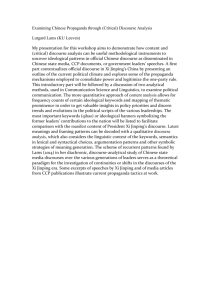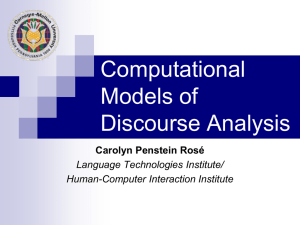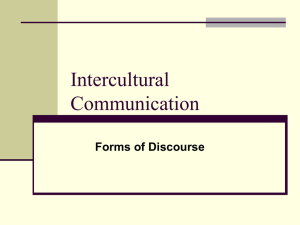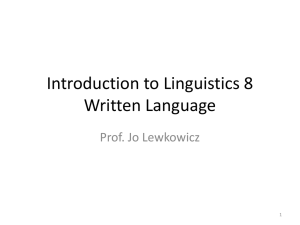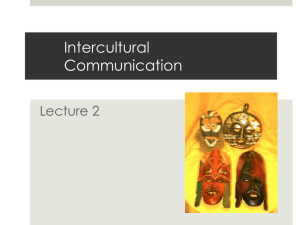长江学者特聘教授申请者 施旭 - Cultural Discourse Studies---
advertisement
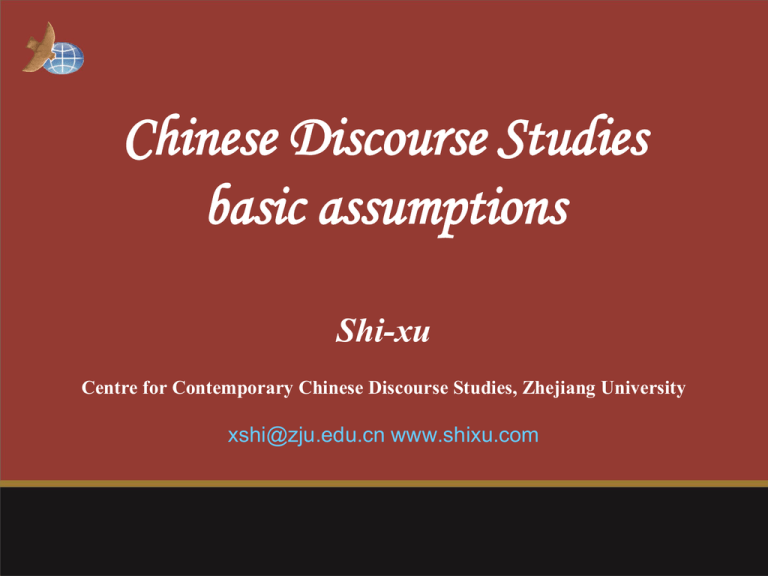
Chinese Discourse Studies basic assumptions Shi-xu Centre for Contemporary Chinese Discourse Studies, Zhejiang University xshi@zju.edu.cn www.shixu.com Aim • To construct a cultural paradigm of discourse studies: “Chinese Discourse Studies (CDS)” – Philosophical component – Theoretical component – Methodological component – Issue component Principles for construction – Capable of reflecting Chinese cultural-intellectual identity and politics – Capable of engaging in intercultural-scholarly dialogue and critique • Terminological intelligibility – Capable of helping with the development of China and its communication with the international communities Foundations of CDS • Chinese contexts as reality – Chinese culture and history; development; unequal order of international relation and communication • Chinese scholarships as resources – – – – Chinese philosophy (e.g. holism, dialect) Chinese communication studies (e.g. ‘He’) Chinese rhetorical studies (e.g. figures of speech) Chinese literary studies (e.g. ‘yi-jing’) Philosophical component – Ontology (holistic): universe as a unified whole of parts in interdependence, interaction and in flux – Epistemology (dialectic): see(k)ing knowledge in a holistic, relational, dynamic, multi-lateral and selfreflexive way – Axiology (pragmatic): ‘use-minded’ and ‘worrying’ scholarship Theoretical component • Contemporary Chinese discourse (CCD) changes in response to history and culture • CCD is guided by the rule of “meaning beyond language” • CCD is guided by the norm of equilibrium (i.e. harmony, inclusiveness, other-orientation, modesty, zhongyong) • CCD is guided by a dialectic way of thinking (i.e. seeing opposites, connections, changes) • CCD gives precedence to authority • CCD cares about face • CCD sets great store by patriotism • CCD values aesthetic effects Methodological component 1 Researching principles • Study discourse holistically (look for entirety, connection) • Study discourse dialectically (look for change, opposition, complexity, oneself) • Study discourse historically (seek historical description, explanation and evaluation) • Study discourse inter-culturally (seek intercultural description, explanation and evaluation) • Study discourse rationally and intuitively (use evidence and experience) • Study discourse dialogically (seek meaning through dialogue continuously) Methodological component 2 Analytic/evaluative categories • Speaker/hearer/hearer-speaker? – Identifications and relations • Textual content/form? – topics, definitions, speech acts, metaphors, etc. • Mediums? – Languages, media, setting/timing • Consequences? – social, economic, cultural and other changes • Historical approach to all the above – changes, contrasts, (dis)continuities • Inter/intra-cultural approach to all the above – connections, contrasts, domination, resistance, transformations Topical component • • • • • • • • Discourse of development Discourse of profession Discourse of ethnicity Discourse of sovereignty Discourse of the environment Discourse of crisis Discourse of cultural change Discourse of intercultural communication In Conclusion • Characteristics of CDS – ‘Holistic’ ontology, ‘dialectic’ epistemology, ‘worrying’ axiology, ‘imaginative and harmonious’ theory, ‘dialogical’ methodology, ‘development’ issues • Through interdisciplinary, inter-linguistic, intercultural cooperation • By becoming ‘strategic’, developingworld-leading intellectuals Thank you 谢谢大家 Спасибо Danke شكرا Merci Obrigado ありがとうございました Gracias Ahsante Sana
